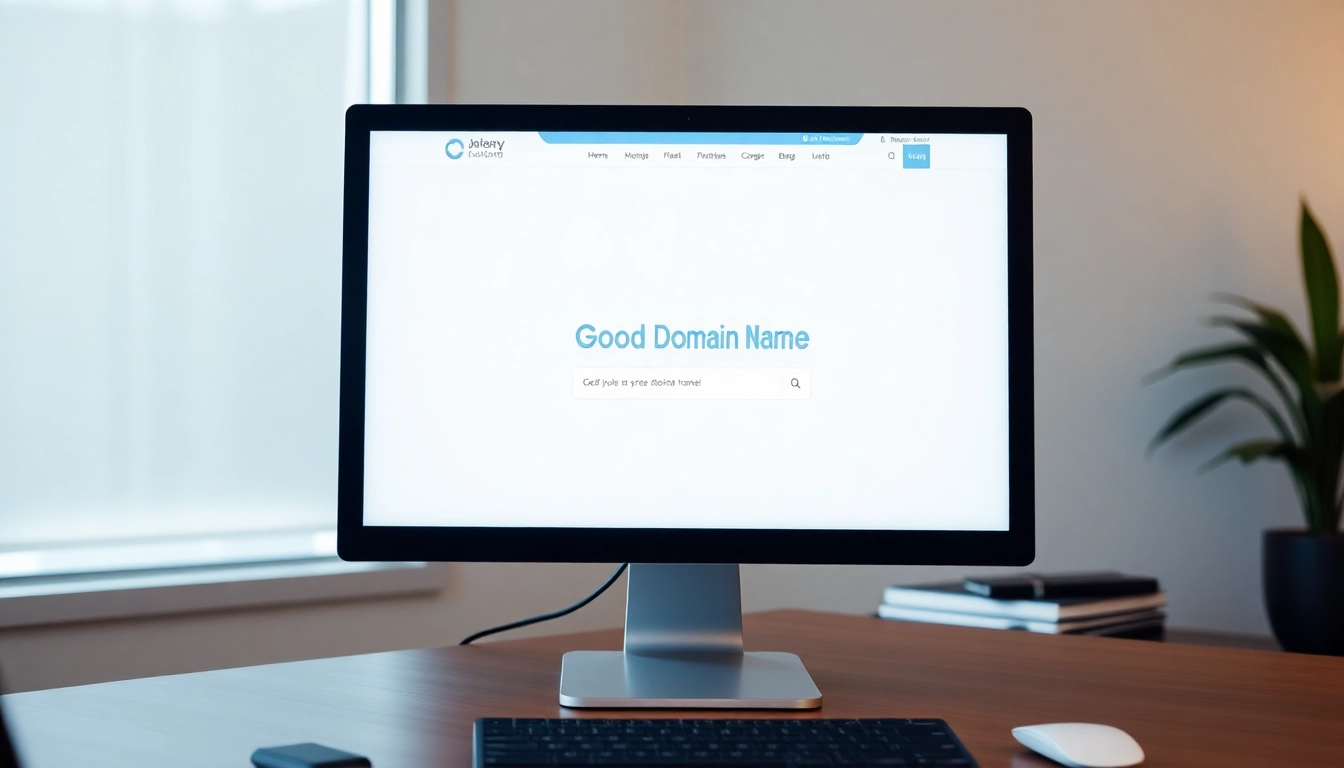Understanding the Importance of a Good Domain Name for Your Brand
In the digital age, establishing a strong online presence is essential for any business or individual seeking visibility and credibility. Central to this online identity is the domain name—a fundamental asset that can significantly influence how your brand is perceived, found, and remembered. A good domain name does not merely serve as a web address; it embodies your brand’s essence, builds trust with your audience, and plays a crucial role in your overall digital strategy. Understanding the profound impact of choosing the right domain name is vital for long-term success in the highly competitive online marketplace.
Why a Memorable Domain Name Enhances Credibility
First impressions matter, especially online. A memorable domain name immediately communicates professionalism and stability. When visitors land on your website, their perception of your brand hinges partly on the domain name’s credibility. Brands with concise, clear, and relevant domain names tend to appear more trustworthy and legitimate. For example, a domain like freshbakes.com instantly conveys the core of the business—fresh baked goods—without confusion or ambiguity.
Furthermore, a good domain name simplifies word-of-mouth marketing. If your domain is easy to spell and remember, existing customers are more likely to recommend it to others, amplifying your brand awareness organically. This credibility attracts partnerships, investors, and new customers, all of which are crucial components of building a reputable online presence.
Impact on Search Engine Rankings and Visibility
Beyond creating a professional image, a strategic domain name directly influences your search engine optimization (SEO) efforts. Incorporating relevant keywords into your domain can improve your site’s ranking for those terms, making it easier for potential customers to discover your business. For instance, a domain like affordablewebdesign.com clearly indicates the niche, helping search engines associate your site with related queries.
While Google’s algorithms have evolved to prioritize content quality and user experience, a relevant domain name remains a valuable SEO asset. It enhances click-through rates, especially when your domain aligns well with search intent. Additionally, a concise and descriptive domain reduces bounce rates, signaling to search engines that your website offers relevant, reliable information, thereby boosting your visibility.
Aligning Your Domain with Your Business Identity
A good domain name should reflect your brand’s core identity, values, and target audience. It helps establish clarity and consistency across your marketing channels. When your domain name resonates with your brand, it reinforces your messaging and makes it easier for consumers to associate your website with your overall brand image.
For example, a startup focused on eco-friendly products might opt for a domain like greenessentials.com to communicate sustainability at a glance. Similarly, a local business might include geographic identifiers, such as SeattleBakery.com, to emphasize local relevance. Choosing a domain that aligns with your brand positioning ensures cohesion across your marketing efforts and enhances brand recognition over time.
Key Factors to Consider When Selecting a Good Domain Name
Relevance and Keywords for Better SEO
Relevance is at the heart of an effective domain name. Incorporating keywords that describe your products, services, or niche amplifies your visibility. For instance, an online fitness coach might consider a domain like personaltrainingpro.com. However, balance is key—overstuffing your domain with keywords can appear spammy and reduce memorability.
Research popular search terms in your industry and select a domain that naturally includes these keywords. Use tools like Google’s Keyword Planner or SEMrush to identify high-volume, low-competition keywords relevant to your business. This strategic approach enhances your chances of ranking higher in search results and attracts targeted traffic.
Length, Simplicity, and Ease of Pronunciation
Shorter domain names are generally more memorable and easier to communicate. Ideally, your domain should be under 15 characters—short enough to be easily typed and recalled. Avoid complex spellings, numbers, or hyphens, which can cause confusion and typos.
Simplicity extends to pronunciation. A domain like easybake.com rolls off the tongue effortlessly, making it more likely to be shared verbally. Consider conducting pronunciation tests and reading your domain aloud to ensure it’s clear and natural.
Domain Extension Choices and Their Implications
The traditional .com extension is still the gold standard due to its familiarity and trustworthiness. However, alternative extensions like .net, .org, or industry-specific TLDs (top-level domains) can also be effective, especially if the .com version is unavailable. For example, startups in a specific niche can consider .tech, .design, or .shop.
Regional TLDs like .us or .co.uk are valuable for local or regional businesses. Ultimately, your choice depends on your target audience, geographical focus, and branding strategy. Consistency and clarity should guide your extension decision to avoid confusion or misdirection.
Steps to Secure a Premium Good Domain Name
Conducting Effective Domain Research and Availability Checks
Begin by brainstorming a list of potential names aligned with your brand and SEO goals. Use domain registration platforms to check availability and explore variations if your preferred choice is taken. Tools like GoDaddy, Namecheap, or Instant Domain Search can expedite this process.
If a premium domain is already owned but unused, consider reaching out directly to negotiate a purchase—sometimes at a reasonable price—or using domain brokers for assistance. Always verify the domain’s history to prevent issues stemming from prior misuse or penalties.
Strategies for Name Brainstorming and Creativity
Leverage creative techniques such as combining relevant keywords, using portmanteaus, or employing alliteration to craft memorable names. For example, merging “Fast” and “Delivery” could inspire “Fastlery.com.” Brainstorm sessions, competitor analysis, and customer surveys can generate fresh ideas.
Use online generators and thesauruses to expand your options. Remember, aim for a name that stands out, is easy to spell, and aligns with your brand’s personality and values.
Registering and Protecting Your Chosen Domain Securely
Once you select your domain, proceed with registration through reputable registrars. Opt for secure payment options and enable domain privacy protection—also known as WHOIS privacy—to shield your personal information from public view.
Secure your domain with multi-factor authentication and consider registering similar domain variants or misspellings to prevent competitors or cybersquatters from exploiting your brand. Regular renewal and monitoring ensure uninterrupted ownership and brand protection.
Common Mistakes to Avoid with Good Domain Names
Using Overly Complex or Confusing Names
A common pitfall is selecting names that are too long, complicated, or difficult to spell. Such domains increase the risk of typos and reduce memorability, ultimately hindering word-of-mouth spread and organic traffic. For instance, a domain like supercalifragilisticexpialidocious.biz is memorable for the wrong reasons.
Neglecting Brand Consistency and Future Growth
Your domain should align with your overall branding and future expansion plans. Avoid using overly specific names that might limit your growth or restrict your brand to a niche. For example, a domain like NYC-Pizza.com is great locally but may hinder growth if you plan to expand nationally or diversify your offerings.
Overlooking Legal Considerations and Trademarks
Legal pitfalls can tarnish your brand and lead to costly disputes. Before finalizing your domain, conduct a comprehensive trademark search to ensure your chosen name does not infringe upon existing brands. Incorporate legal counsel or use trademark databases like the USPTO to verify your domain’s safety.
Optimizing Your Good Domain Name for Long-Term Success
Regular Domain Management and Renewal Practices
Managing your domain proactively is crucial. Keep track of renewal dates, set automated reminders, and avoid lapses that could allow competitors to acquire your domain. Periodic audits of your domain portfolio help identify opportunities for renewal or consolidation.
Integrating Your Domain into Your Broader Branding Strategy
Your domain is part of a cohesive branding ecosystem. Incorporate it into your logo, social media profiles, marketing campaigns, and email signatures. Consistent branding across all touchpoints enhances recognition and trust.
Monitoring Performance and Making Adjustments as Needed
Use analytics tools to track your domain’s performance regarding traffic, conversion rates, and search rankings. If your domain underperforms, consider branding adjustments, content strategy evolution, or even rebranding—all while protecting your digital assets.



